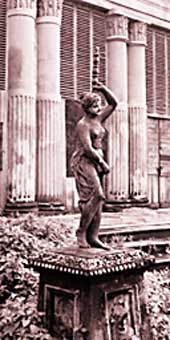 |
| Borrowed works |
DANCING ROUND THE MAYPOLE: GROWING OUT OF BRITISH INDIA By Rani Sircar, Rupa, Rs 195
Rani Sircar’s Dancing Round the Maypole is particularly fascinating to me because I come from the world she describes. But hers was what I might call the Indo-British view while I saw that world as a member of the British Indian community. She was the daughter of anglicized Indians, her father was an Anglican clergyman, while I was the son of an English boxwallah. With our family there was no conflict of cultures. My parents’ ambition was to ensure that as little of India as possible rubbed off on us.
We Tully children had a European nanny whose role was to protect us from India, to stop us from becoming too familiar with the servants, to make sure that we only played with British children, and only spoke English. I remember getting a slap across the head when she discovered me learning to count in Hindustani from the driver. Nanny Oxborrow was particularly fond of our grandfather, but she strongly disapproved of his teaching us to recite nursery rhymes in Hindustani. I left India before coming of an age to question all this. There seemed nothing unnatural about being British in India to a nine year old child.
Rani Sircar on the other hand tells of a culturally confused childhood. She was well aware that she was Indian but at times wished she was English. Her father had been ordained in Salisbury’s magnificent cathedral and inevitably carried some of that culture back to India, but her mother always insisted that she was Indian to the core. She had Anglo-Indian teachers who appeared to know all the great names of British history but were unaware of any great men India had produced, and until the Quit India movement, spoke derogatorily of “natives”.
Rani Sircar married into Indo-Britain too. Her mother, being very much on the Indian side of the equation, didn’t allow a wedding cake at the ceremony describing it as “phiringi nonsense”. But because British executives, friends and colleagues of her Indian boxwallah husband-to-be were coming, he insisted that phiringi liquor — inevitably Scotch — should be served. She has telling memories of the racial attitudes which prevailed even after Independence in Calcutta’s mercantile community. A white man told her, “You simply can’t go to that native doctor. I’d writhe and shrivel up inside if those brown hands touched me”, and went on to suggest her virtue might not be safe in those hands because she wouldn’t know “what oriental vices he’s got”.
I never saw the sort of unpleasantness that Sircar came across. As a child, it was hidden from me by the very agreeable life we lived. I can’t believe that my parents would have behaved as some of the people she remembers did. I was once reminded by Calcutta’s archbishop, Cardinal Picachi, that his sister had been my father’s secretary and was very fond of him. I then remembered that they had remained in contact long after he left Calcutta.
Nevertheless it is good for people like me who were born as British citizens in India to be reminded how unpleasant our compatriots often were. Sircar’s memories make me even more appreciative of all the generosity I have been shown in independent India, my imperial past has never once been held against me. This book will be important for historians too, giving them an insight into important but insufficiently studied communities and reminding them that for the British, there was no crime like “going native” because that undermined the basic concept that upheld the Empire — the concept that we whites were different, that only we were fit to rule.
This book is important for Calcutta too because it was the capital of the culture Sirkar half-belongs to. She herself says she reminisces only because her memories have “perhaps a certain curiosity value”. They are worth more than that.











